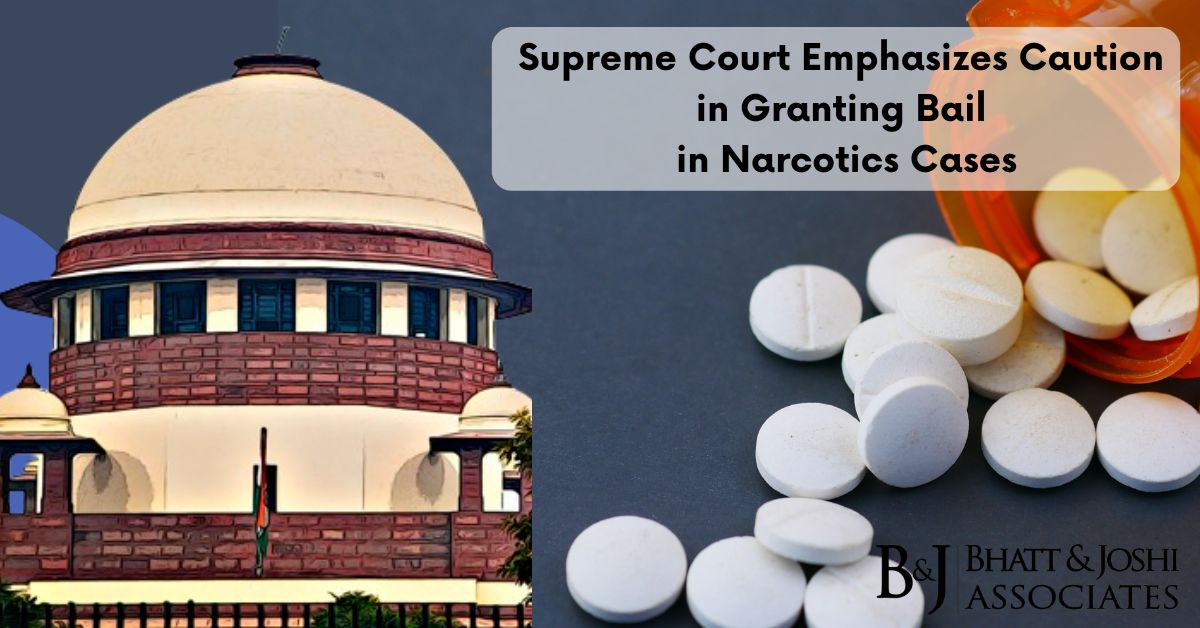Bail in Narcotics Cases: Supreme Court Emphasizes Caution in Granting Anticipatory Bail in Narcotics Cases
Introduction
In a significant judicial pronouncement, the Supreme Court of India has underscored the need for caution when considering bail applications, especially in cases involving the seizure of substantial quantities of narcotics. The apex court’s decision came in response to an appeal against a Madras High Court order granting anticipatory bail to an accused in a narcotics case related to the alleged possession of 232.5 kg of ganja.
Background of the Case
The Supreme Court quashed the Madras High Court’s order, terming it “cryptic and perverse.” The bench, consisting of Justices B R Gavai and Sandeep Mehta, highlighted the failure of the high court to adequately consider crucial factors, such as the accused’s criminal antecedents and involvement in two previous cases under the Narcotic Drugs and Psychotropic Substances (NDPS) Act.
Judicial Scrutiny and Section 37 of the NDPS Act
The apex court expressed its concern regarding the substantial quantity of narcotics involved in the case, asserting that even regular bail should be approached with caution, let alone anticipatory bail, especially when the accused has criminal antecedents. The court invoked Section 37 of the NDPS Act, which deals with bail for offenses involving commercial quantities of narcotic drugs or psychotropic substances.
Anticipatory Bail Quashed: Supreme Court’s Narcotics Case Critique
The bench quashed the anticipatory bail granted to the accused, B Ramu, and criticized the peculiar conditions imposed by the Madras High Court. Justice Mehta, who authored the judgment, deemed the conditions “alien to the principles governing bail jurisprudence” and emphasized that the courts should exercise caution, particularly when dealing with such significant quantities of narcotics.
Legal Principles Governing Bail in Narcotics Cases
Justice Mehta stressed that the High Court’s approach was not aligned with the legal principles governing bail, especially when faced with the recovery of a substantial amount of a narcotic substance. The court highlighted the unusual condition set by the High Court, requiring the deposit of a sum of Rs 30,000 to the credit of the registered Tamil Nadu Advocates Clerk Association in Chennai.
Failure to Record Satisfaction and Ignoring Criminal Antecedents
The Supreme Court observed that the Madras High Court failed to record the necessary satisfaction when the public prosecutor opposed the grant of anticipatory bail. Additionally, the court noted that the High Court overlooked the accused’s criminal antecedents and his involvement in two previous cases under the NDPS Act.
Bail Caution in Narcotics Cases: Supreme Court Directive
In conclusion, the Supreme Court quashed the “cryptic and perverse” order of the Madras High Court and directed the accused, B Ramu, to surrender before the trial court within 10 days. The decision serves as a reminder of the importance of adhering to legal principles and exercising caution in granting bail, particularly in cases involving substantial quantities of narcotics and individuals with criminal histories.
 Whatsapp
Whatsapp


